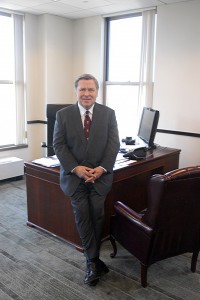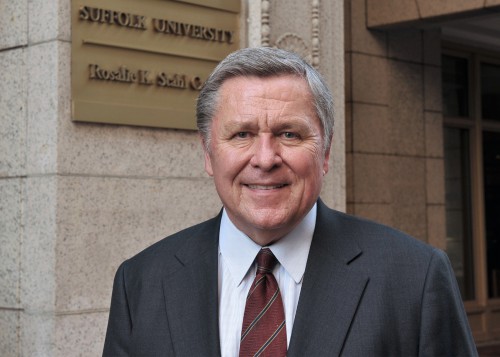
As Suffolk welcomes its new President, Dr. Norman Smith, faculty and students have expressed a mix of opinions on what they hope the new president will bring to the university, as well as their reflections on former president James McCarthy. They opined about the suddenness of the switch, their thoughts on the necessity of new leadership, their hopefulness for the future, and their initial impressions of the new president.
Although most students and faculty have not met Smith yet, they have become oriented to him through emails describing his background and intention at Suffolk. In an email sent to students, Smith wrote that he “look[s] forward to spending at least the coming academic year working on behalf of the Suffolk University community,” and that he is “very excited to be a part of the Suffolk family.”
Smith was appointed president in late August, just days before the start of the academic year. The Suffolk community only became aware of this change after it was in place, and received no message from James McCarthy.
Chair of the communication and journalism department, Dr. Robert Rosenthal, spoke fondly of McCarthy in an interview with the Journal last week.
“He was by far the best communicator we’ve ever had,” Rosenthal said of the former president. “He reached out more than any other president.”
Along with praising McCarthy’s interaction with faculty and students, he also reflected on his accomplishments and the legacy he left behind at the university, particularly for his advocating of Suffolk’s new academic building at 20 Somerset Street, which is set to be completed in fall 2015. Although the university had owned the property for some time, construction had been on hold due to financial restrictions. “He found a way to get it done,” said Rosenthal.
In addition to advocating for the construction of a new academic building, McCarthy also put into place a five-year strategic plan for the university.
“He had a strong vision of who we are and where we want to go,” said Rosenthal. “He positioned us nicely for the future.”
Although Rosenthal referred to McCarthy’s sudden replacement as “unusual,” he has confidence that Smith will serve as a positive addition to the university. Given his extensive background in higher education, Rosenthal believes Smith will be, “a builder for the university” and will also “improve on what we already have.”
Although little is known about Smith’s specific plans for the university, Rosenthal speculated that his presidency might focus on marketing Suffolk “more aggressively.” He went on to add, “Suffolk has always had good people at the top … people who have always cared deeply, and I think that says something. I think Smith is going to be right there with them.”
Like Rosenthal, many students express fond memories of McCarthy, noting his involvement with students as he led the university.
“I thought he was a good president,” Erica LeBlanc said of McCarthy. “He was very friendly. He was a good person … I met him a few times, he shook my hand, had awesome conversation.”
LeBlanc, a senior, was shocked when she heard of McCarthy’s abrupt leave, and expects Smith to interact with students just as much.
“I’m sure he’s going to try and be as present, or hopefully he will be,” she said. “If you’re not connected with the students then you can’t really run a university.”
Victoria Ireton, a government major and an orientation leader, also hoped that the new president would make an effort to know the student body.
“I think that change is an important constant in the world,” she said. “I only hope that the new president brings the change that the university needs … Suffolk is a small university and it’s important to the students to know the people that run it.”
Likewise, a staff member at Suffolk remembers McCarthy as someone who was “very warm and friendly. He remembered my name even though I didn’t interact with him very much.” He said he was “sad to see him go.”
Others are hoping for some consistency. Junior and president of Rainbow Alliance, Amy Kerr said about Smith, “The only thing we’ve really heard about him is that he turns around universities. So that just makes me think, who’s the next person we’re going to get in a few years?”
Government Professor John C. Berg said abrupt changes are not new at Suffolk.
“Both President Sargent and President Perlman departed abruptly,” Berg recalled. “I think that’s the nature of things when a President and Board don’t see eye to eye.”
Suzyn Ornstein, a professor of management and entrepreneurship at Suffolk said, “the timelines of a change in executives for any organization is highly variable. Some transitions are planned for and known about years in advance, like when a president makes plans to retire. Other times the public isn’t made aware of the plan, so when the announcement comes, it feels very sudden.”
There are many reasons why boards of directors and presidents cannot announce these kinds of changes until they’ve come full circle.
“Whenever there is a leadership change, people are never made aware until the decision is made because they have no power over the situation,” Ornstein said.
Legal obligations also keep boards and presidents from making early announcements. When a president retires, he might announce his decision to retire to the school years ahead of time.
“If the change is of any other kind of nature, then it is a personnel matter, and you don’t share personnel matters” because of laws governing employees’ privacy rights, Orstein said.
When considering that Suffolk has had two presidents within five years, it is helpful to keep two other things in mind, she said.
“First, although things appear to be moving very quickly, looking back over 25 years, there has not been much change. But, secondly, now there are great pressures on all institutions of higher education to make changes of a variety of sorts,” she said.
Like many people, Ornstein was surprised at what seemed to be a sudden change. “But the new interim did come and speak at the first faculty luncheon. I was impressed by his experience, and I am optimistic he can help this institution become even greater.”
Despite positivity from some, students with concerns about Suffolk’s leadership still linger.
“I think it’s kind of stressful knowing that the person who is technically supposed to be in charge is completely new to our school,” said Paige Stanley, a junior and sociology major. “I would imagine that it takes time to adjust to a new school and the workings of that school.”
Some faculty and staff are skeptical as well. A professor from the marketing department said, “As an adjunct, I am not affected too much by changes in the administration. But I was somewhat surprised by Dr. Smith’s background. He seems to be a ‘turnaround specialist’ for universities, and I didn’t realize that Suffolk needed a turnaround. I guess I am interested in what new steps he will take.”
While there are various perspectives on this shift in presidency, and worries about upcoming changes to the university, it seems that both students and faculty are hoping for what Smith refers to in his letter addressed to students as a “notably successful 2014-15 school year.”













